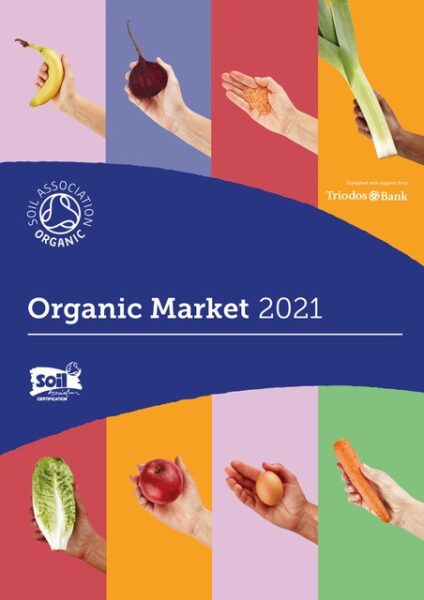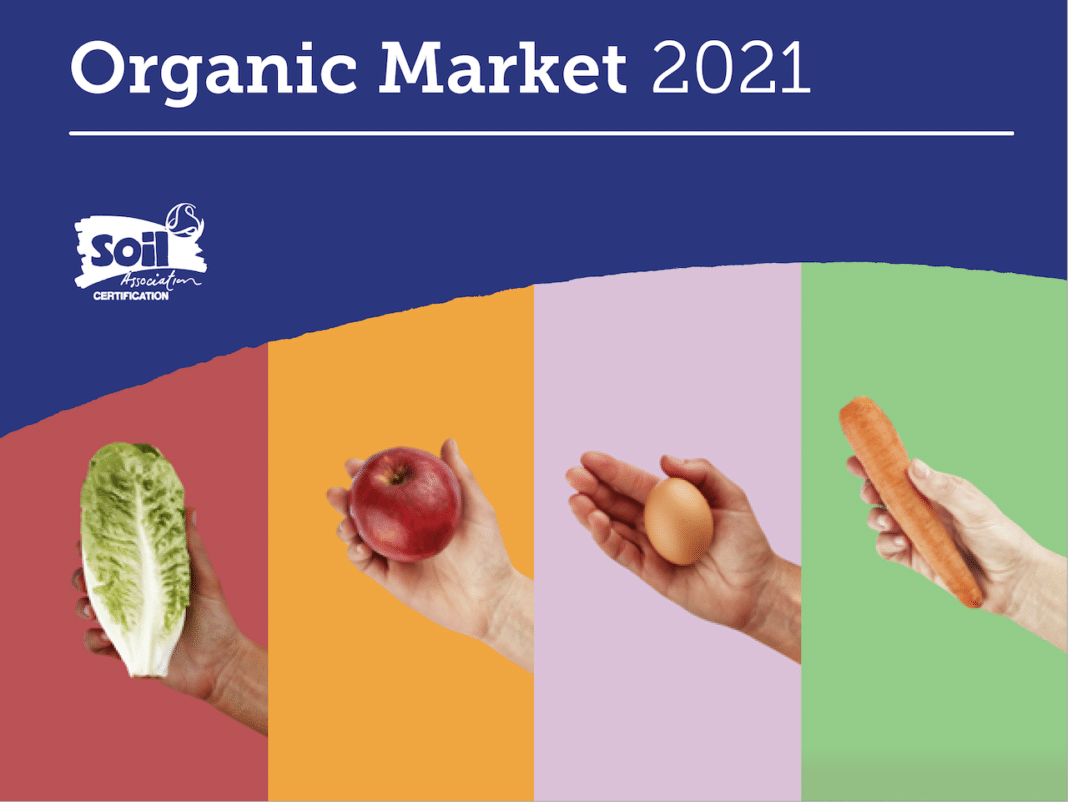The UK organic market is now worth £2.79 billion after hitting a 15-year high in 2020 when it saw a 12.6% growth in sales.
During 2020 alone, over £50 million was spent each week on organic food and drink in the UK. These figures, released today in Soil Association Certification’s Organic Market 2021 report (sponsored by Triodos), show that the organic market’s growth is now outperforming the non-organic sector.
Key insights from the 2021 report
- This is the highest year-on-year growth rate the organic market has seen since 2005 – and its tenth consecutive year of growth
- The organic sector is on track to reach £2.9 billion by end of this year
- Changing shopping habits during the pandemic translated as more than a £50 million weekly spend on organic during 2020, with total sales hitting £2.79 billion
- Much of the growth was fuelled by online shopping and home delivery, with ‘almost one in four organic products purchased online in 2020’; organic sales in this category of retail increased by 36.2%, leading this channel to market to account for almost 25% of total sales (supermarket online sales included)
- The organic online and home delivery channel reached almost £500 million, ‘surpassing independent retailer sales for the first time’
- Supermarket sales of organic increased by 12.5% (based on Nielsen RMS data for the 12 months ending 2 Jan 2021, for the GB total retail market)
- Growth was also reported across Beauty & Wellbeing and Textiles, with sales of Soil Association-certified beauty and wellbeing products up by 13%, reaching a total £120.2 million in 2020. Sales of Soil Association-certified organic textiles grew by 9%, to be worth £49.5 million, despite a significant decline in global fashion sales of 20%.
 Finn Cottle, trade consultant, Soil Association Certification, says: “The unprecedented crisis of 2020 has brought immense challenges across the entire food supply chain – not least for organic businesses. So, it’s significant that in times of crisis, people are turning to organic products for the assurance of transparency, integrity and quality they provide. Organic is now rightfully recognized as the cornerstone of a resilient food and farming system and a vital part of the solution to the climate, nature and health crises.
Finn Cottle, trade consultant, Soil Association Certification, says: “The unprecedented crisis of 2020 has brought immense challenges across the entire food supply chain – not least for organic businesses. So, it’s significant that in times of crisis, people are turning to organic products for the assurance of transparency, integrity and quality they provide. Organic is now rightfully recognized as the cornerstone of a resilient food and farming system and a vital part of the solution to the climate, nature and health crises.
“With people spending more time at home preparing and planning meals, many shoppers are also appreciating the incredible range of organic options that are available online, with stand-out growth of 36.2% in this channel. With the organic market growing faster than ever and expected to reach £2.9 billion by the end of 2021, there is a huge opportunity for organic businesses to innovate and continue growing the market.”
Soil Association Certification notes that ‘while shopping trips became more planned and less frequent’ there was increased consumer interest in ‘good quality and healthy food’ during 2020, which helped drive sales of organic. The certifier’s own research (conducted in July 2020) found that people commonly associated the word organic with ‘safe and fully traceable food with less pesticides, and no genetically modified organisms’.
Increased interest in box schemes during the pandemic has also ‘driven up customer numbers, orders and sales for many operators, substantially strengthening the success of this longstanding organic channel’.
It’s significant that in times of crisis, people are turning to organic products for the assurance of transparency, integrity and quality they provide
Rob Haward, managing director of Riverford, comments: “Riverford was already experiencing strong growth early in 2020, before COVID, driven by a desire for more organic and plant-based eating. In the face of the surge in demand we experienced during the pandemic we reduced our range back to veg boxes to meet our customers’ needs and limit our sales to new customers. We are now building back up to a narrower more veg-focused range.
“Even with these measures in place our sales increased by more than 40% compared to the prior year, and sales are remaining at these high levels as the continuing restrictions on people’s lives drives strong demand for home delivery of fresh organic food.”
The report highlights the organic categories seeing the strongest growth as: beers, wines and spirits, which enjoyed a 32.9% growth; chilled and frozen, which both grew by 22.2%; canned and packaged goods, up 19.8%; meat, fish and poultry, which saw an increase of 16.8%; and finally produce, with a 15.5% lift in sales.
While online and veg box deliveries were bolstered by lockdowns, the report acknowledges the ‘mixed fortunes’ faced by independent retailers: “Whereas several city centre stores closed, high street and community stores experienced huge increases, with citizens choosing to shop locally. Overall, this amounted to a +0.9% rise in the organic market through independent retail.”
Foodservice, it adds, ‘took a hit’ due to private sector closures and experienced an overall decline of -23.2%. Sales of organic into public procurement, it notes, continued at ‘a stable level’.












